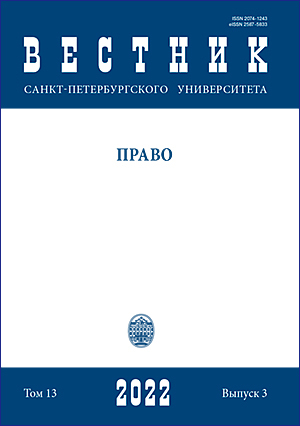Transforming the prohibition of torture in the context of rising terrorist threats
DOI:
https://doi.org/10.21638/spbu14.2022.302Abstract
The article explores the content of the prohibition of torture in constitutional and international acts. The ban is absolute, as confirmed by the extensive practice of international human rights organizations. At present, a revision of the general attitude towards torture in Western Europe is taking place against the background of increasing terrorist threats. In the United States, after the September 11, 2001 terrorist attack, at the level of Justice Department directives, certain methods of “intensive interrogation” were allowed in order to obtain information from persons captured during anti-terrorist operations. It was assumed that in the conditions of the “war on terror”, terrorists were not subject to the privileges provided for by the Geneva Conventions in relation to prisoners of war. Our study involves an analysis of a wide range of sources on problems of the use of torture in the context of countering terrorism, and provides an analysis of foreign scientific discussions of the admissibility of torture against terrorists. One argument is the lack of moral boundaries among terrorists themselves, capable of committing deadly attacks against civilians. Supporters of the use of torture proceed from the principle of extreme necessity for obtaining information about the planned terrorist acts. Opponents of torture proceed from the principle of the moral absolute, which does not justify attaining a goal by any means. In modern legal science there is a search for a balance of interests: the dignity of a person suspected of preparing a terrorist act, and the safety of other citizens, society, and the state.
Keywords:
torture, human dignity, prohibition, ticking bomb, constitutional value, terrorism, threat
Downloads
References
Downloads
Published
How to Cite
Issue
Section
License
Articles of "Vestnik of Saint Petersburg University. Law" are open access distributed under the terms of the License Agreement with Saint Petersburg State University, which permits to the authors unrestricted distribution and self-archiving free of charge.






